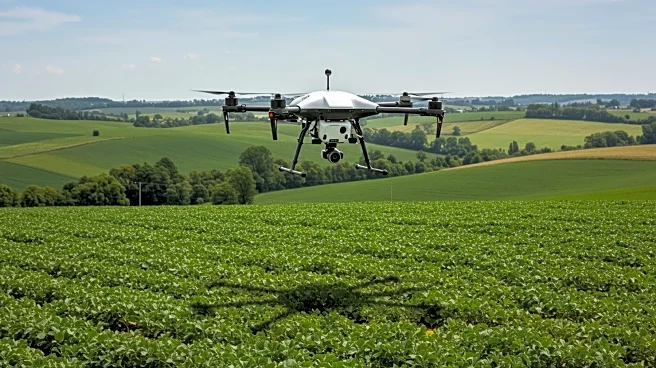What is the story about?
What's Happening?
Farmonaut, a satellite technology company, is spearheading a transformation in agriculture with the introduction of advanced agritech solutions for 2025. These technologies include precision agriculture, automation, gene editing, vertical farming, blockchain, and renewable energy integration. Precision agriculture utilizes satellites, drones, sensors, IoT, and AI platforms to provide detailed monitoring of crops and farm health, optimizing resources like water and nutrients. Automation and robotics are reducing labor dependency with autonomous tractors and robotic harvesters. Gene editing is enhancing crop resilience and yield, while vertical farming is maximizing food production in urban areas. Blockchain technology is improving transparency and traceability in the food supply chain. Renewable energy solutions, such as solar and wind power, are being integrated to reduce agriculture's carbon footprint.
Why It's Important?
The adoption of these technologies is crucial as the global population grows and climate change challenges intensify. Precision agriculture can significantly reduce input waste and increase yields, contributing to sustainability and food security. Automation addresses labor shortages and enhances efficiency, while gene editing and biotechnology improve crop resilience and nutritional value. Vertical farming offers a sustainable solution for urban food production, reducing land and water use. Blockchain ensures food authenticity and builds consumer trust. Renewable energy integration supports sustainable farming practices, reducing reliance on fossil fuels. These advancements collectively aim to create a more resilient and efficient agricultural sector, essential for meeting future food demands and environmental goals.
What's Next?
Farmonaut plans to continue expanding its platform, making these technologies accessible to farms of all sizes. The company offers satellite-based monitoring, AI-powered advisory, and blockchain traceability through mobile, web, and API solutions. As these technologies become more widespread, they are expected to drive significant changes in farming practices, improving productivity and sustainability. The integration of renewable energy and advanced data analytics will further enhance farm management and environmental impact tracking. Stakeholders, including farmers, agribusinesses, and policymakers, will need to adapt to these innovations to fully realize their benefits and address the challenges of modern agriculture.
Beyond the Headlines
The ethical and cultural implications of these technologies are significant. Gene editing and biotechnology raise questions about food safety and biodiversity. The shift towards automation may impact rural employment and community structures. Blockchain's role in ensuring transparency could redefine consumer-producer relationships. The integration of renewable energy aligns with global sustainability goals, but requires careful management to balance economic and environmental interests. These developments highlight the need for ongoing dialogue and regulation to ensure that technological advancements in agriculture are equitable and beneficial for all stakeholders.















